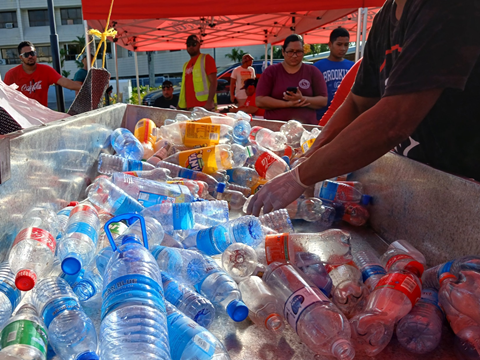
Over 80,000 used PET bottles and aluminium cans have reportedly been collected via Coca-Cola Europacific Partners (CCEP) and Samoa and Tokelau Association of Recyclers (S.T.A.R.)’s collection and segregation initiative this month.
The Return and Pay Saturday Initiative is a pilot taking place in central Apia over the course of three months. Its goal is to gauge consumer interest in returning used beverage containers, with consumers receiving 5 sene for each container returned.
S.T.A.R. and CCEP hope that encouraging the collection of bottles and cans will keep recyclable waste out of the Tafaigata Landfill. Once S.T.A.R. has collected the cans, CCEP is tasked with exporting the waste for recycling into new beverage containers.
This initiative is intended to raise consumer awareness of simplified waste management practices, bolster circular economy principles, and support the extended producer responsibility framework promoted by CCEP.
According to Nancy Vito, president of S.T.A.R., the initiative collected a total of 34,000 beverage containers when it was launched at the end of April. This has “more than doubled” in the meantime, which Vito considers “a great sign our local community is keen to collect and return their beverage bottles and cans.”
“We’re delighted to have such high levels of consumer engagement,” Vito continued. “Families, church youth groups and environmentally concerned citizens are returning their containers and on Saturday earned a total of $4,000 for the effort.
“The collected cans and bottles will go to the Coca-Cola Distribution Centre at Vaitele for crushing and aggregation for shipment offshore for recycling. It is important for us to shift our mindsets so that we can support the sustainability of our environment for our future generations to come.
“S.T.A.R. believes that this initiative is just one of many solutions that will address Samoa’s plastic problem. S.T.A.R. continues to collect, and stockpile plastics, and aluminum cans confidently to eventually resolve, the ongoing issue of plastics along the kerbside, and from entering our beautiful seas via littering around the seawall and around the island.”
Moira Simi, sales manager for CCEP Samoa, adds: “This is an important strategic initiative for us which is consistent with our desire to ensure our packaging is collected and recycled and does not find its way into the environment. We are extremely happy to be in partnership with STAR as a progressive Samoan recycling organisation and we look forward to continuing the program and extending it to other areas of Samoa.”
This development comes after UN Special Rapporteur on Toxics & Human Rights Marcos Orellana expressed concern that CCEP may have violated environmental laws and human rights standards by transitioning from reusable glass bottles back to single-use alternatives in Samoa.
The company is feared to have contributed to one-third of the country’s plastic bottle waste within a few months of the transition, with bottles imported from abroad thought to increase transit-related emissions and the release of plastics and microplastics into the environment.
A legal complaint against Coca-Cola has also driven the company to revisit the ‘misleading’ claims of 100% recycled and recyclable content on its plastic bottles. Apparently, these statements only applied to certain components of the bottle, excluding features like caps, inks, colourants, and adhesives.
In other news, Aldi Hungary recently claimed that, since the country’s national deposit return system was introduced in January 2024, around 140 million items of single-use packaging had been returned to its in-store REpont machines – resulting in a daily average of 3,000+ plastic, aluminium, and glass bottles per store.
If you liked this story, you might also enjoy:
The ultimate guide to the Packaging and Packaging Waste Regulation in 2025
How are the top brands progressing on packaging sustainability?
Everything you need to know about global packaging sustainability regulation in 2025
The key to increasing the use of reusable packaging in supermarkets














No comments yet